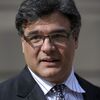In a major blow to the Trump Administration's immigration policy, another federal judge has ruled that attempts to end the popular Deferred Action for Childhood Arrivals program, or DACA, are illegal. However, the judge gave the Administration 90 days to appeal the decision. Meanwhile, the travel ban finally reaches the Supreme Court today. All three versions of the travel ban have been ruled unconstitutional at every level of the federal courts. Now it's the Supreme Court's turn to weigh in.
Wednesday is the regular segment looking at nuclear issues, including weapons, energy, waste, and the future of nuclear technology in the United States. Today, they discuss the pushback on a proposed new nuclear waste facility in New Mexico (submit comments against the facility at beyondnuclear.org), the Iran nuclear deal potentially being ripped apart, the North Korea-US talks, and the US breaking of international law about nuclear non-proliferation. Kevin Kamps, the Radioactive Waste Watchdog at the organization Beyond Nuclear, joins the show.
Busloads of Central American migrants arrived in Tijuana Mexico yesterday, where they intend to turn themselves in to US border authorities and to ask for asylum. Most of the migrants are from Honduras and are fleeing crime, violence, and political repression in that country. The Trump Administration, however, is warning that anybody without a valid claim will be swiftly deported. And anybody who tries to cross the border will be arrested and prosecuted. Brian and John speak with Jorge Barón, the executive director of the Northwest Immigrant Rights Project.
A Filipino human rights activist scheduled for a speaking tour in the US was detained upon arrival at San Francisco Airport. A Customs and Border Protection officer said there was a problem with Jerome Aba's visa, but Aba maintains that customs officers planted a weapon on him and tortured him when he was first detained. Adrian Bonifacio, National Chairperson of Anakbayan-USA, and Mong Palatino, a journalist and former member of the Philippines' House of Representatives who was set to be on the same speaking tour as Jerome Aba, joins the show.
The Taliban announced the start of their annual spring offensive today, dismissing an offer of peace talks by President Ashraf Ghani, but pledging to focus on attacking only US forces in Afghanistan. Ghani had called for peace talks without any preconditions, but the Taliban refused, calling the offer "a conspiracy." Brian Terrell, a long time peace activist and a co-coordinator of Voices for Creative Nonviolence, joins Brian and John.
Pakistan's former Prime Minister Nawaz Sharif is on trial in that country on myriad corruption charges. He and his family have been major political players in Pakistan for much of the past 30 years and have been accused of corruption before. But allegations of Sharif having assets beyond his means, leaked as part of the Panama Papers, may be enough to finally put him in prison. Marvin Weinbaum, the Scholar-in-Residence for the Middle East Institute's Center for Pakistan Studies, joins the show.
Facebook yesterday made public for the very first time a 27-page memo explaining the criteria for banning content on its site. The company also said that it would be more clear about its privacy policies in light of a new European Union law mandating transparency. Meanwhile, Twitter has released its privacy policy to the public. Brian and John speak with Professor Bryan Ford, who leads the Decentralized/Distributed Systems lab at the Swiss Federal Institute of Technology in Lausanne.
We'd love to get your feedback at radio@sputniknews.com


